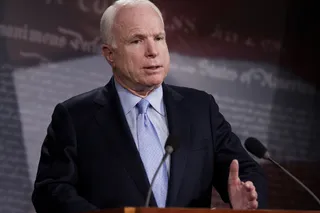Super PACs 101
Why super PACs matter in the 2012 presidential election.

1 / 9
The facts about Super PACs - Get the facts about these fundraising groups, the attack ads that have made headlines and why you should know the name super PAC come Election Day.—Britt Middleton

2 / 9
What are Super PACs? - Super PACs are special interest groups separate from a candidate’s campaign, but they can run ads, make phone calls and otherwise rally support for a specific candidate in the same way a candidate’s campaign would. There is no limit to the amount of money they can raise from individuals, corporations and other groups in order to support or defeat a political candidate. (Photo: Ethan Miller/Getty Images)

3 / 9
What Are the Restrictions of a Super PAC? - Super PACs cannot donate money directly to a political candidate’s campaign, nor can they coordinate with the political candidate they’re supporting. “The independence of such operations is murky at best, however, since many super PACs are run by people with close ties to the candidates they support,” the Washington Examiner reports.(Photo: AP Photo/Spartanburg Herald-Journal, Michael Justus)

4 / 9
What Is the Difference Between a PAC and a Super PAC? - Regular Political Action Committees can’t solicit money from groups, and they can only accept individual contributions of up to $5,000. Regular PACs are also restricted in how much money they can donate directly to candidates.(Photo: Allison Joyce/Getty Images)

5 / 9
How Did Super PACs Come Into Play? - In 2010, the U.S. Supreme Court lifted a ban that prohibited corporations and unions from independently spending money to influence federal elections. A subsequent court ruling in SpeechNow.org v. Federal Election Commission (FEC), created Super PACs as they are now defined.(Photo: Allison Joyce/Getty Images)
ADVERTISEMENT

6 / 9
Where Is the Money Going? - Most of the cash raised for super PACs have gone toward attack ads. According to recent reports, super PACs spent more than $9 million in advertising in South Carolina, which votes Jan. 21. Restore Our Future, the super PAC backing GOP contender Mitt Romney, recently bought $3.4 million in TV ads in Florida, which votes Jan. 31, the Washington Examiner reports.(Photo: Chip Somodevilla/Getty Images)

7 / 9
Controversy All Around - Since groups can make donations, one of the largest criticisms of Super PACs is that it becomes difficult to track exactly whom is spending what to support a candidate. One of the largest critics of super PACs is former Republican presidential nominee John McCain, who, according to the Washington Examiner, called the Supreme Court’s ruling to allow Super PACs to persist as “one of the worst decisions ever seen." (Photo: Brendan Smialowski/Getty Images)
Photo By Brendan Smialowski/Getty Images

8 / 9
Newt Gingrich Slams Mitt Romney for Super PAC Attack Ads - Restore Our Future, a Super PAC supporting Republican presidential candidate Mitt Romney, drew the ire of Romney’s opponent, Newt Gingrich, when the group began running a slew of negative attack ads in December 2011. A recent spot slams the former House speaker for being reprimanded by the ethics committee among other claims. “Newt attacks because he has more baggage than the airlines,” the ad declares. (Photo: Scott Olson/Getty Images)
